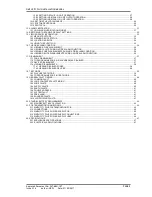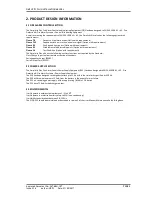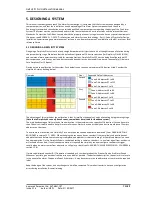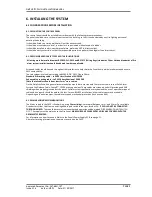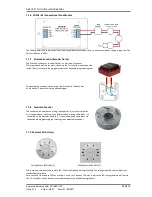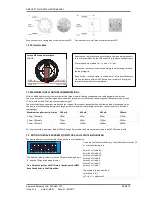
SIMPLICITY PLUS INSTALLATION MANUAL
Approved Document No: GLT.MAN-107
PAGE 3
Issue 3.16 Author: NRPJ Date: 21/09/2017
1. SAFETY INFORMATION
WARNING: Read this section completely before commencing installation.
1.1 INSTALLATION INFORMATION
THIS FIRE ALARM CONTROL PANEL IS CLASS 1 EQUIPMENT AND MUST BE EARTHED.
This equipment must be installed and maintained by a qualified and technically experienced person.
This C.I.E. must be wired to a fused spur rated at 3A. It must NOT be connected via a removable plug, or be connected
through an RCD device.
Prior to commencing installation of the control panel, ensure that adequate precautions are taken to prevent damage to
the sensitive electronic components on the display board and the control board due to electrostatic discharge. You should
discharge any static electricity you may have accumulated by touching a convenient earthed object such as an unpainted
copper radiator pipe. You should repeat the process at regular intervals during the installation process, especially if you
are required to walk over carpets.
The panel must be located in a clean, dry position, which is not subject to excessive shock or vibration and at least 2
metres away from pager systems or any other radio transmitting equipment. The operating temperature range is 0ºC to
40ºC; maximum humidity is 95%.
HANDLING THE PCBS
If the PCBs are to be removed to ease fitting the enclosure and cables, care must be taken to avoid damage by static.
The best method is to wear an earth strap, but touching any earth point (e.g. building plumbing) will help to discharge any
static. Always handle PCBs by their sides and avoid touching the legs of any components. Keep the PCBs away from damp
dirty areas, e.g. in a small cardboard box.
1.2 SAFETY PRECAUTIONS DURING NORMAL OPERATION OF PANEL
NOTE: When the Simplicity Plus panel is operating normally, i.e. not being tended by service personnel, the access door
must be closed and locked. After locking, the key MUST be removed and ONLY held by the responsible person and / or the
service personnel. It must under NO CIRCUMSTANCES be held by the user.
1.3 BATTERY INFORMATION
This C.I.E. uses 2 x 12V Sealed Lead Acid (SLA) batteries up to 12Ah.
CAUTION:
RISK OF EXPLOSION IF BATTERY IS REPLACED BY AN INCORRECT TYPE. DISPOSE OF USED BATTERIES ACCORDING TO
BATTERY MANUFACTURERS INSTRUCTIONS.
IMPORTANT NOTES ON BATTERIES:
DANGER:
Batteries are electrically live at all times.
NEVER short circuit the battery terminals.
WARNING:
Batteries are often heavy; take great care when lifting and transporting batteries. For weights above 24 kilos,
lifting aids should be used.
DANGER:
Do NOT attempt to remove the battery lid or tamper with the internal workings of the battery. Electrolyte is a
highly corrosive substance, and presents significant danger to yourself and to anything else it touches. In case of
accidental skin or eye contact, flush the affected area with plenty of clean, fresh water and seek immediate medical
attention. Valve Regulated Lead Acid (VRLA) batteries are “low maintenance”, requiring no electrolyte top-up or
measurement of specific gravity.
1.4 PRODUCT DISPOSAL AT THE END OF ITS WORKING LIFE
Like all electronic equipment, at the end of its working life this unit should not be disposed of in a refuse bin. It should be
taken to a local reprocessing site as per the guidelines of the WEEE directive, for correct disposal.



